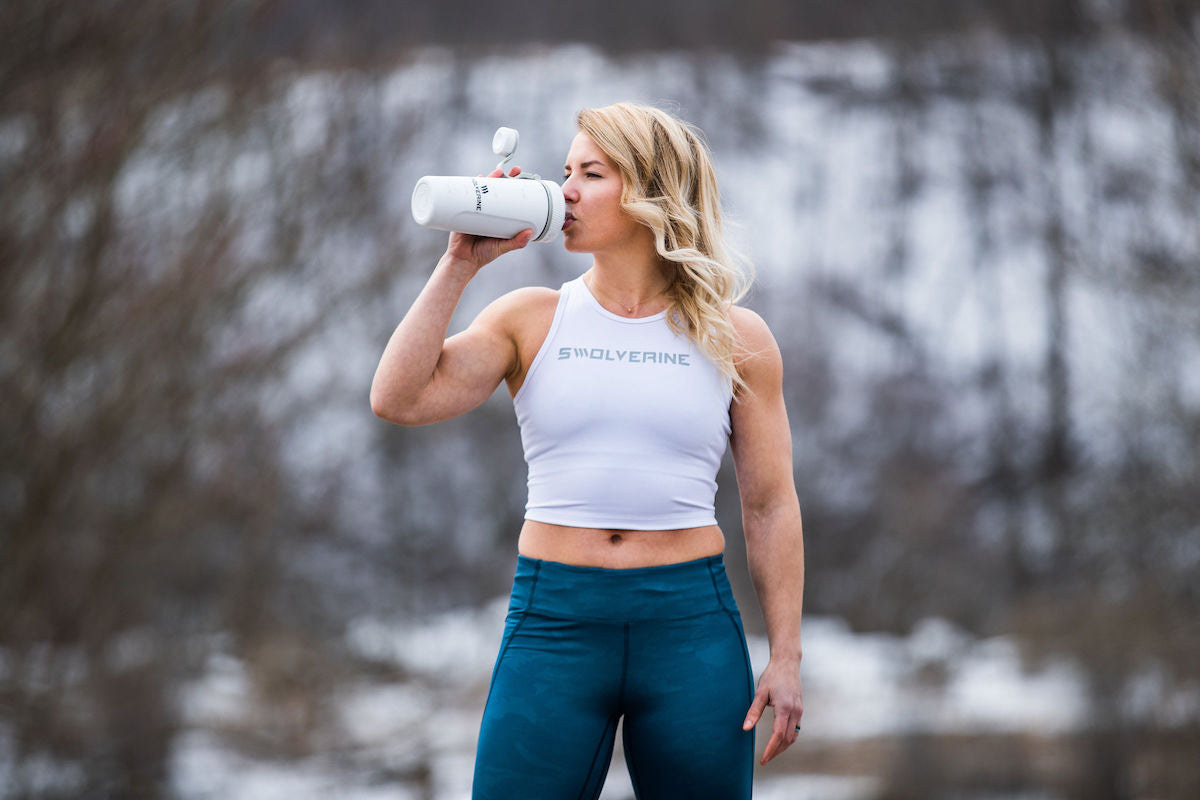Gains aren’t built at the gym; they’re built at home, after your workout while you’re recovering. Your post-workout nutrition, plays a pivotal role, in fueling your body with the proper nutrients it needs to build and rebuild lean muscle mass. What you eat matters and we’re going to talk about what you need to eat post-workout, to get the results you want.
In this article, we will explore what you need after your workout, to enhance your athletic performance, recovery, and build more muscle
The Ultimate Guide to Post-Workout Nutrition
If you’re not fueling properly before, during, and especially after your workout, you’re leaving results on the table. Post-workout nutrition plays a critical role in your recovery, performance, and ability to build lean muscle mass. What you eat after training can significantly influence how fast you recover, how strong you get, and how your body adapts to stress.
"Exercise capacity, performance, and recovery can be enhanced by evidence-based nutritional interventions through the manipulation of different variables: nutrient composition, quantity, and timing."
— Tipton & Wolfe, 2001, Journal of Sports Sciences
Why Is Post-Workout Nutrition Important?
There are three primary goals of post-workout nutrition:
-
Replenish amino acids to stimulate muscle protein synthesis
-
Repair muscle tissue and minimize muscle breakdown
-
Rebuild glycogen stores to restore energy levels and reduce fatigue
Together, these actions jumpstart recovery and set you up for improved performance in your next session.
What to Eat After a Workout
Your post-workout strategy should focus on two key macronutrients: Protein and Carbohydrates.
Protein: The Foundation of Muscle Repair
Protein provides the building blocks for muscle tissue—amino acids, especially branched-chain amino acids (BCAAs) like leucine, which triggers muscle protein synthesis (MPS) and reduces proteolysis (muscle breakdown).
Post-exercise protein intake has been shown to increase strength, enhance muscle repair, and reduce delayed onset muscle soreness (DOMS)
— Phillips, 2004, The Journal of Sports Science & Medicine
How Much Protein Do You Need?
-
RDA for sedentary individuals: 0.8g/kg of body weight
-
For active individuals: 1.4–2.0g/kg/day is recommended to support recovery and muscle adaptation
— Jäger et al., 2017, Journal of the International Society of Sports Nutrition
Recommended Protein Options
-
Whey Protein Isolate: Fast-digesting and rich in EAAs and BCAAs. Ideal post-workout.
RECOMMENDED PRODUCT: Whey Protein Isolate -
Plant-Based Protein: Pea protein is a top option, providing a complete amino acid profile.
RECOMMENDED PRODUCT: PLANT PROTEIN
Carbohydrates: Replenish Glycogen and Restore Energy
Glycogen, the stored form of glucose in your muscles, is your body’s primary fuel source during moderate-to-high intensity exercise. Post-workout carbs replenish depleted glycogen stores, which helps restore energy and prevent fatigue.
“Glycogen depletion is a major factor contributing to fatigue during exercise.”
— Cermak & van Loon, 2013, Sports Medicine
Why Carbs Matter
-
Help restore glycogen stores
-
Support faster recovery
-
Reduce muscle breakdown
-
Enhance endurance capacity
RECOMMENDED PRODUCT: Clean Carbs
Best Post-Workout Protein + Carbohydrate Sources
| Protein | Carbohydrates | Carbohydrate-Rich Fruits |
|---|---|---|
| Whey Protein Isolate | Clean Carbs | Bananas |
| Chicken Breast | Brown Rice | Blueberries |
| Tuna / Ahi Tuna | Sweet Potatoes | Strawberries |
| Salmon | Quinoa | Apples |
| Lean Beef or Turkey | Whole Wheat Spaghetti | Pears / Plums |
| Eggs | Oatmeal | Peaches |
| Greek Yogurt | Yams / Asparagus / Broccoli | Avocados |
Nutrient Timing: When Should You Eat After a Workout?
The Anabolic Window: Still Relevant?
The “anabolic window” refers to the 30–60-minute period after training when your body is primed to absorb nutrients. While this window matters most when training in a fasted state (like early-morning workouts), it may not be as critical if you’ve eaten 1–2 hours before training.
"When pre-exercise nutrition is sufficient, the urgency to eat immediately post-exercise is reduced."
— Aragon & Schoenfeld, 2013, Journal of the International Society of Sports Nutrition
Fasted Training
If you trained fasted (i.e. no food within ~6 hours), consume a protein + carbohydrate shake immediately after your workout to prevent catabolism and jumpstart the recovery process.
Fed State Training
If you ate within 1–2 hours pre-workout, your body may still be digesting and absorbing nutrients post-exercise. In this case, your post-workout meal or shake can be less urgent, but still beneficial.
My Go-To Post-Workout Shake
If you're short on time or simply not hungry post-training, try this fast, easy, and performance-optimized shake:
Best Post-Workout Shake:
-
1 scoop Chocolate or Vanilla Whey Protein Isolate
-
1 scoop Clean Carbs
-
1 tbsp peanut butter or powdered PB
-
½–1 frozen banana
-
Blend with water or almond milk
This combo offers a perfect ratio of protein to carbs—plus it tastes incredible.
Final Thoughts: Why Post-Workout Nutrition Matters
Skipping your post-workout nutrition is like running your car without gas and expecting it to win races. The truth is: what you eat after your workout directly influences how well you recover and how quickly you improve.
To optimize your post-training results:
-
Prioritize high-quality protein and carbohydrates
-
Adjust nutrient timing based on your training and meal schedule
-
Choose fast-digesting forms (like shakes) when convenience matters
Whether you’re chasing muscle, strength, endurance, or fat loss—post-workout nutrition is non-negotiable.
Post-Workout Nutrition
Why Post-Workout Nutrition—and the Right Supplement—Matters
At the end of the day, your workout is only as effective as your recovery. You can train harder, lift heavier, and sweat more—but without proper post-workout nutrition, you’re slowing down your progress and limiting your body’s ability to rebuild, refuel, and adapt.
The science is clear: pairing protein and carbohydrates post-training accelerates muscle protein synthesis, reduces muscle breakdown, and replenishes glycogen to support strength, endurance, and long-term performance.
But the real game-changer? A supplement that delivers all of that—plus more—in one convenient scoop.
Why Swolverine POST Is the Next-Level Recovery Formula
Swolverine POST isn’t just another protein powder. It’s a complete post-workout recovery solution, combining clinical doses of:
-
20g of Protein from Pea Protein Isolate – A complete, plant-based source rich in BCAAs and EAAs to support lean muscle growth and recovery.
-
Carbohydrates from Carb10® (Pea Starch) – A low-glycemic, fast-absorbing carb source that replenishes glycogen stores without spiking blood sugar or causing bloating.
-
Superfoods Papaya and Pineapple – Natural digestive enzymes papain and bromelain enhance nutrient absorption and reduce inflammation.
-
5g of L-Glutamine – The most abundant amino acid in muscle tissue, crucial for reducing soreness, supporting gut health, and speeding up muscle repair.
This formulation is designed not only to rebuild muscle and replenish energy, but to support overall recovery from the inside out—including digestion, nutrient assimilation, and cellular repair.
Whether you're training fasted, hitting back-to-back workouts, or just want a recovery routine that actually works, Swolverine POST bridges the gap between effort and results.
So, What Should You Do Post-Workout?
Fuel smart. Recover faster. Optimize performance.
✅ Prioritize fast-absorbing protein + carbs
✅ Include anti-inflammatory compounds and digestive enzymes
✅ Supplement with Swolverine POST for a complete, clinically effective post-training solution
Your training doesn’t end when you rack the barbell—it ends when you give your body the fuel it needs to adapt, rebuild, and grow stronger.
RECOMMENDED PRODUCT:
👉 Swolverine POST – Complete Plant-Based Recovery Formula







